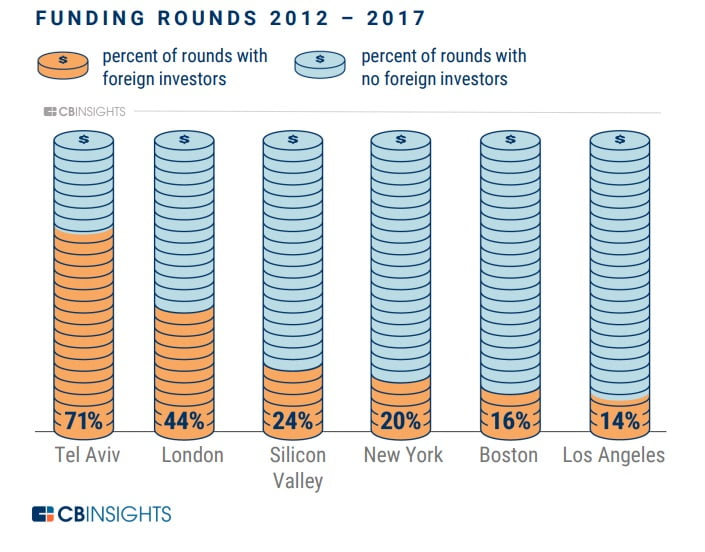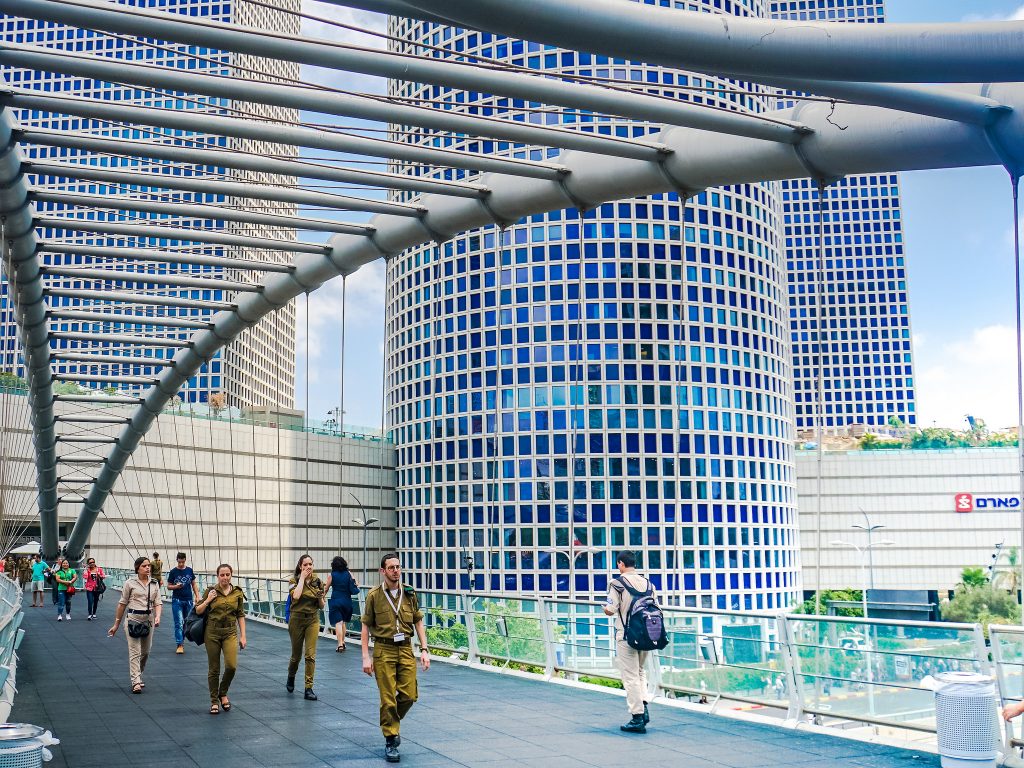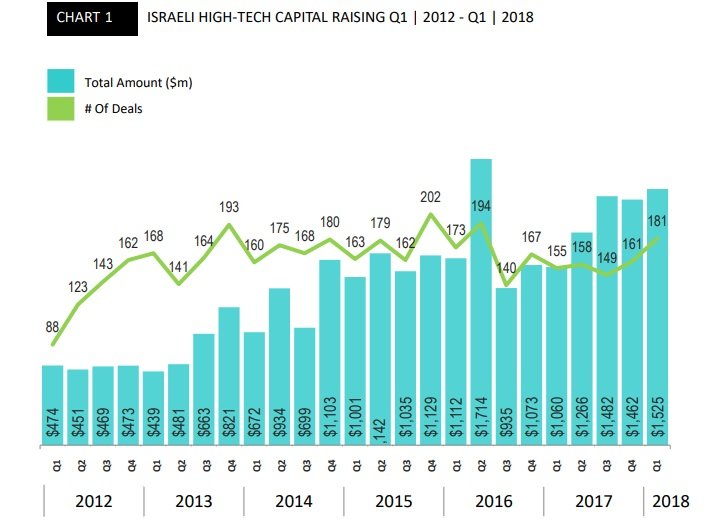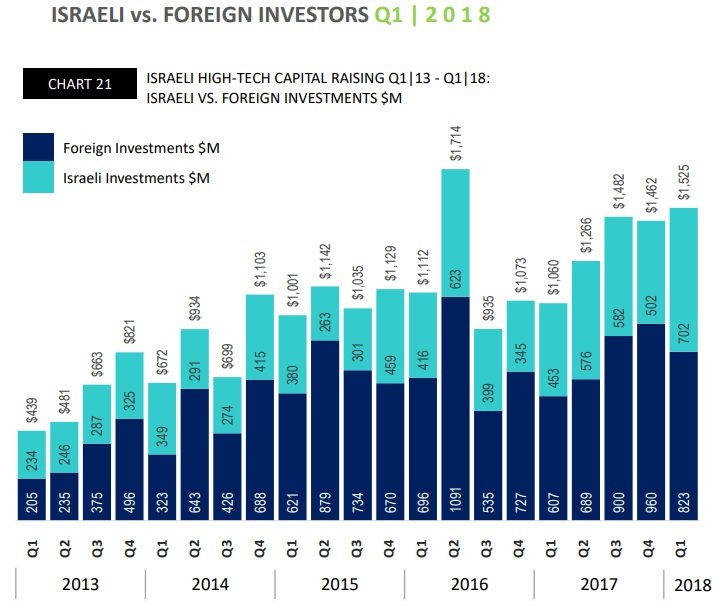While Silicon Valley is still “off the charts” as a global tech hub, Beijing and Shanghai are catching up and Tel Aviv is among the most influential and most international, with more deals involving foreign investors, according to a new report this week by New York-based research firm CB Insights.
The report looks at 25 tech hubs around the world, comparing and contrasting their growth, and dividing them into three classes: “heavyweights,” including Boston, London, Los Angeles, New York, Silicon Valley, and Tel Aviv; “high-growth hubs,” such as Austin, Bengaluru, Beijing, Berlin, New Delhi, Paris, Seattle, Shanghai, Tokyo, and Toronto; and “up and comers,” including Amsterdam, Barcelona, Denver, Mumbai, Sao Paulo, Seoul, Stockholm, Sydney, and Vancouver.
SEE ALSO: Israeli Unicorns: These 18 Companies Are Valued At Over $1B
Tel Aviv, according to the report, has fewer exits than the others in its class – 19 between 2012 and the first quarter of 2018 – but 14 percent of the exits in the city in those years have been valued at over $100 million. “Large exits are the best indicator of a healthy ecosystem,” CB Insights says. Silicon Valley had over 250 exits of above $100 million in that same timeframe, but they account for 12 percent of deals, according to the report.
The city also attracts a high number of foreign investors among the “heavyweights.” Seventy-one percent of funding rounds for Israeli start-ups between 2012 and 2017 have involved foreign investors, according to the report, with London coming in second at 44 percent and Silicon Valley with 24 percent.

A chart by CB Insights from a report in June 2018 showing the interest of foreign investors in the Israeli high-tech sector. Screenshot
Tel Aviv is also a draw for a higher number of corporate investors, who have been involved in 25 percent of deals in 2012-2017, four points higher than Silicon Valley with 21 percent.
CB Insights defined the heavyweight hubs as those with a higher concentration of later stage rounds, stable growth rates, and a higher density of engineering hires.
Maturing market
Indeed, the Israeli research firm IVC has noted that more investments over the past two years were pouring into later-stage companies. In a report released earlier this year, IVC said that, in 2017, companies in mid- to late-stages attracted more capital than firms in earlier stages – $3.9 billion of the total of $5.24 billion for that year.
IVC’s Research Director Marianna Shapira said in a statement at the time that “investors poured more capital into fewer selected companies, providing portfolio companies the necessary means to mature.”
“In 2017, the capital raising volume increased, continuing the consistent growth trend of the past five years. The high-tech industry matures and settles as the source of innovation and interest for investors and entrepreneurs from all over the world,” said Adv. Shmulik Zysman, a managing partner leading the high-tech sector at Israeli-American law firm ZAG S&W, which also drafted the report.
Sign up for our free weekly newsletter
SubscribeLast year also saw Israeli companies and startups sold for a total of $23 billion in 112 deals in a number of exit transactions including IPOs, mergers and buyout deals, reflecting a 19 percent increase from 2016, according to a separate report by IVC and law firm Meitar Liquornik Geva Leshem Tal.
A promising 2018
And in a new in-depth study this week on the first quarter of 2018, the IVC Research Center and ZAG S&W reported that Israeli companies raised $1.52 billion in 181 deals, a significant rise compared to Q1/2017 which saw $1.06 billion raised in 155 deals.
Three deals, each over $100 million accounted for 23 percent of the total capital raised in Q1/2018, according to the report. In March, social trading company eToro announced it has raised $100 million in a Series E funding round. That same month, Orbs, which develops blockchain infrastructure for brands, raised $106 million. And two months earlier, medical device company Insightec, which developed an incision-less MRI-guided focused ultrasound, raised $150 million, also in a Series E private equity round.
Investments by non-Israelis have also grown with the report recording that foreign investments accounted for 54 percent of capital raised in the high-tech sector, “making this one of the highest quarters of past 5 years.”
“The number of foreign investors has accelerated over the past three years, with a ratio of 1.6 foreign investors
for every Israeli investor in Q1/2018,” read the report. However, Israeli investors are more active, as more deals have involved Israeli investors throughout the years: 85 percent vs. 51 percent with foreign investors in Q1/2018.
Meanwhile, the study noted that corporate investments in the Israeli market have been “experiencing a cool-down period for the two last quarters,” investing $204 million or 13 percent of total capital in Q1/2018.
VC funds have made up the majority of the investments this period, at 29 percent, with investment companies following at 18 percent, or $275 million. Private investors, meanwhile, have put in $164 million or
11 percent of the total capital in Q1/2018.
The first quarter of the year was also marked by two major exits, that of Israeli electronics maker Orbotech to California semiconductor equipment maker KLA-Tencor Corp for $3.4 billion in March, and of Israeli flavoring and fine ingredients company Frutarom to American multinational International Flavors & Fragrances (IFF) for $7.1 billion.
Related posts

Editors’ & Readers’ Choice: 10 Favorite NoCamels Articles

Forward Facing: What Does The Future Hold For Israeli High-Tech?

Impact Innovation: Israeli Startups That Could Shape Our Future






Facebook comments